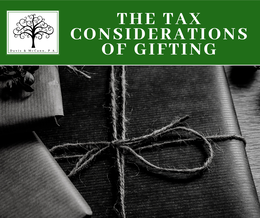 It is not uncommon for clients to inquire about giving assets away to their loved ones, either as a one-time gift or as part of a long-term gifting plan. What many people do not realize is that there are tax consequences associated with making a gift. As Benjamin Franklin once said “…in this world nothing can be said to be certain, except death and taxes.” Before you decide to make gifts to your family, here are some tax considerations you should be aware of: Annual Gift Tax Exclusion – The annual gift tax exclusion is an amount put in place by the federal government that an individual is allowed to gift in any given year without tax consequences. It often changes from year to year, although it has now been the same since 2018. The annual gift tax exclusion amount for the year 2021 is $15,000. Therefore, an individual can gift up to $15,000 per person this year and not pay any taxes on it. There are also no required tax filings for making this gift. For example, I could gift $15,000 to each of my three children (for a total of $45,000 gifted) and I would not have any taxes to pay on those gifts, nor would I file anything with the Internal Revenue Service (IRS). My spouse could also gift the same amount. Lifetime Gift Tax Exemption – The lifetime gift tax exemption is the total amount that I am allowed to gift during my lifetime without suffering a tax penalty. It typically changes from year to year. The lifetime gift tax exemption amount for 2021 is $11,700,000. Therefore, I can gift $11,700,000 in assets this year and I will not have to pay any taxes. However, I will have to file a Form 709 Gift Tax Return to show that I have used my lifetime exemption. Any exemption that I use by making gifts during my lifetime, is taken off of what I am able to leave tax free at my death via the estate tax exemption. For example, if I make a gift this year that uses $1,000,000 of my lifetime exemption, then two years later I die and the estate tax exemption amount is $12,000,000 at the time of my death (estate tax exemption amount is what an individual is allowed to leave tax free at their death), then I will only be able to leave $11,000,000 estate tax free ($12,000,000 less the $1,000,000 of my exemption that I already used by making gifts during my lifetime). This is why, even though no tax is due, a gift tax return is required if I use any of my lifetime exemption amount. It allows the IRS to keep track of how much exemption an individual has. Please be aware, that this is a simplified discussion of the potential tax consequences associated with making gifts. There are also other considerations to be made before beginning a gifting program for your loved ones. Prior to doing any gifting, you should consult a tax professional and your estate planning attorney. For more information on gifting, please contact Davis & McCann, P.A. We are members of Wealth Counsel, a national consortium of Estate Planning Attorneys and the National Academy of Elder Law Attorneys (NAELA). We focus our practice on providing clients with the best legal advice on Estate Planning, Medicaid and Long-term Care Planning, Family Business/Small Business Succession Planning, Probate, Trust Administration, Real Estate Transactions, and related matters. |
NEWS YOU CAN USEDavis & McCann, P. A., Archives
April 2021
Categories
All
|

 RSS Feed
RSS Feed